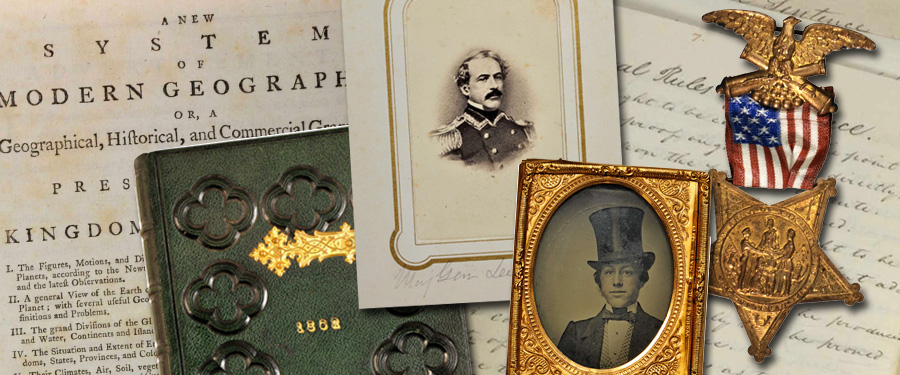
Stack’s Bowers Galleries is pleased to offer several items from the recent sale of the extensive holdings of the Swiss noble family Grand d’Hauteville. The family’s holdings were kept at Chateau d’Hauteville, a castle in the municipality of Saint-Légier-La Chiésaz, Canton Vaud, Switzerland. Included are several important items relating to the career of Alexander Macomb, “The Hero of Plattsburgh,” who in 1828 rose to the position of Commanding General of the United States Army. Macomb’s granddaughter Susan Watts married into the Grand d’Hauteville family, explaining why many of the general’s most important possessions eventually found their way into the holdings of Chateau d’Hauteville.
Alexander Macomb was born April 3, 1782, in Detroit, which at that time was controlled by the British. He moved to New York City with his parents, Alexander Macomb and Catherine Navarre, and eventually graduated from Newark Academy in New Jersey. Macomb began his military career in 1798 at the age of 16 when he joined a militia company in the New York Rangers. On the recommendation of Alexander Hamilton, Macomb was commissioned into the Regular Army in 1799 as a Cornet, gaining promotion to second lieutenant before being discharged in 1800. His military career was only beginning, however, for in 1802 he was commissioned a first lieutenant in the Army Corps of Engineers, which had been recently established in West Point, New York as a military academy. Macomb’s early association with what would eventually become the United States Military Academy at West Point made him one of the first officers to receive formal training there. He spent the next several years working on various fortifications until the start of the War of 1812 found him a colonel in the 3rd Artillery Regiment.
Macomb’s reputation as an American war hero was solidified with the Battle of Plattsburgh on September 11, 1814, during which he led a force of only 3,400 regular troops and militia to victory over a British force of 10,531 men under the command of Lieutenant General Sir George Prevost. Macomb conducted a successful delaying action, whittling down the British strength and delaying their assault until news arrived of Commodore Thomas Macdonough’s naval victory over the British at the Battle of Lake Champlain. With their naval support destroyed, Prevost’s troops were forced to abandon their planned invasion of the Northern United States – their last of the War – and retreat into Canada. Lauded as “The Hero of Plattsburgh” in the American press, Macomb received the official recognition of the United States government through promotion to major general and receipt of a Congressional gold medal, cataloged today as Julian MI-16 in the standard reference Medals of the United States Mint: The First Century, 1792-1892 by R.W. Julian.
On May 28, 1828, Macomb was appointed Commanding General of the United States Army by President John Quincy Adams, a position he retained until his death on June 25, 1841. During his tenure, he authored a seminal book on the conduct of courts martial and martial law titled The Practice of Courts Martial. Among the highlights of this sale are a handwritten document from the U.S. War Department appointing Macomb Commanding General of the United States Army and Macomb’s original manuscript for his book on courts martial from 1837.
Our offering of selections from the collection of Chateau d’Hauteville also includes other significant items with American themes, such as the Medal of the Order of the Grand Army of the Republic presented to Frederic I. Sears Grand d’Hauteville in 1917, a copy of the book Travel in the Meadows West of the United States by Washington Irving, printed in Paris in 1835, and a remarkable album of more than 150 period cartes de visite of important political and military figures from the American Civil War. Worthy of careful consideration by students of American military history and more generalized Americana collectors alike, these offerings may very well represents a once in a lifetime bidding opportunity.





